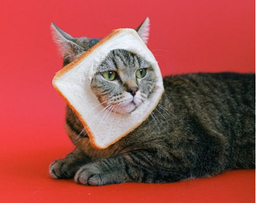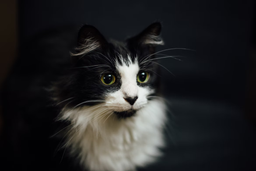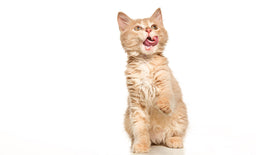Do cats eat more in winter? Untamed clarifies all doubts!
Extreme weather changes impact the metabolism of all living beings, including felines. According to a four-year study conducted by the University of Liverpool’s School of Veterinary Science, a kitty’s appetite increases by 15% during the winter months.
So, why do cats eat more in winter—is it to fuel up or beat the weather blues? Should you let them have an extra helping of food, or would it lead to overeating and weight gain?
Before adjusting your kitty’s meal plan, you should get the answers to the following questions:
- Are there any changes in your cat's metabolism during colder months?
- Should they eat more or less, given their current lifestyle?
- What diet boosts their immune system and keeps cats healthy in winter?
Why do cats eat more in the winter season?
Cats eating more in winter has some science behind it. According to feline nutrition experts, this seasonal eating habit could be:
- A metabolic response
- An instinctive response
Is winter increasing your feline’s metabolism rate?
Exposure to harsh weather—be it a punishing winter or a cruel summer—disrupts the Basal Metabolic Rate (BMR) of all mammals, including cats. BMR is the number of calories your body burns at rest through inactive functions like digestion, circulation, and temperature regulation.
When a cat has to endure a freezing climate, their body works extra hard to stay warm, burning more calories in the process. Kitties out and about in the cold will naturally feel famished and crave frequent meals or larger portions.
The most effective way to make up for the energy loss is to consume more calories. It’s common for hairless breeds like Sphynx to eat significantly more during winter as they don’t have a coat for insulation.

My woolly undercoat and this adorable jumper malfunctioned, hooman. I still feel cold and super hungry!!
Source: buster the catto
Keep in mind that your pet’s metabolism increases only if they spend a lot of time outdoors in the cold. If they stay snug indoors in a temperature-controlled environment without increasing activity levels, their daily caloric requirement will mostly remain the same as during the summer months.
Does your kitty overeat to feel secure?
Not all kitties eat more to maintain thermal balance. It can also be an instinctive response to long periods without sunlight. Cats in the wild are not nocturnal predators but more attuned to hunting their prey (like rodents, birds, and bugs) during the daytime, dusk, or dawn.
Due to the short hunting window during winter, many wild cats had to go without food for a long time.
Experts believe that felines’ primitive hunting behaviour has influenced the way they treat food. Some kitties may start eating more when they notice the days getting shorter during winter. Their survival strategy is to fatten up and keep sufficient energy reserves in case food is not available.
Since regular meals are not an issue for pets, never let your kitty hog food only because they want to. Overfeeding, even for a few months, can lead to obesity and increase the risk of severe diseases like diabetes, hypertension, and arthritis.

Nice day to indulge in melancholy, ponder my existence, and eat my heart out…Can I get some comfort snacks, hooman?
Source: Keenan Barber
It’s not always the hellish weather—other reasons why cats overeat
It’s common for kittens to eat a lot while growing, no matter the weather. If your adult cat constantly seeks more food, you should rule out potential factors behind overeating, including:
- Medical conditions—Cats have a ravenous appetite when they suffer from certain medical conditions, such as diabetes mellitus, hyperthyroidism, and specific types of cancer. These illnesses are often accompanied by other symptoms such as stomach sensitivity, frequent episodes of vomiting or diarrhoea, weight loss, unkempt coat, regurgitation, lethargy, or hyperactivity
- Sterilisation—Kitties undergo hormonal fluctuations after a sterilisation surgery, which can make them eat more during recovery (usually 48 hours)
- Pregnancy—Expecting or lactating queens need more food from the beginning of the gestation period right till they’re done weaning off kittens
- Poor nutrition—Being hardwired carnivores, cats need animal proteins to feel full. Inadequate ingredients like plant proteins, meat derivatives, sugar, vegetables, and grains will leave them wanting more. Overeating is more common in cats who graze on dry food as kitty biscuits are heavily processed, contain many fillers, and hardly offer real meat. A suitable diet for cats would be a high-protein and grain-free wet food
What type of food should cats eat during winter?
Cats don’t need a seasonal diet as long as their meals contain healthy whole meat, fish, and organs. Poor-quality cat food can trigger winter-related woes, such as:
- Dull coat and shedding—Certain breeds like Persians and Maine Coons may shed all year round, but most kitties don’t shed in winter. Cats who don’t get enough protein may shed unnaturally or cough up regular hairballs in winter
- Dry skin, blisters, and frostbites—These skin conditions are related to poor circulation, weak immune function, and hypothermia during winter, often due to a diet lacking in:
- Taurine that supports nervous health and circulation
- Omega-3 fatty acid that plays a key role in regulating temperature
- Brittle nails—Many cats find their nails cracking due to the dehydrating winter atmosphere. This can also be a sign of not enough keratin in their system
To maintain robust health in all seasons, your kitty’s meals should contain more than 50% protein and up to 20% fats. The proteins should come from taurine- and keratin-rich meat like chicken breast and liver, tuna, and shrimp.
If your kitty struggles to keep warm during winter, make sure to enrich their diet with seafood, which is an excellent source of omega-3 fatty acids. This micronutrient not only helps keep kitties warm but also prevents joint pains aggravated by the cold in senior cats.
Here’s a glimpse of the omega-3 content in different meat:
|
Meat |
Serving size |
The omega-3 fatty acid content |
|
85 grams |
30 milligrams |
|
|
Tuna |
85 grams |
228 milligrams |
|
Salmon |
100 grams |
2627 milligrams |
|
Sardines |
100 grams |
1,480 milligrams |
|
Shrimp or prawns |
85 grams |
295 milligrams |
|
Mackerel |
100 grams |
5,134 milligrams |
|
100 grams |
481 milligrams |
|
|
Beef |
100 grams |
40 milligrams |
Keep your kitty warm and cosy with Untamed wet food!
If you’re searching for cat food that is tasty and nutritious, switch your feline to Untamed! Our wet food is prepared with human-grade whole meat and fish, offering all the necessary proteins and fatty acids kitties need to thrive. Our catalogue includes:
- Complete gravy food with 63% whole meat
- Complementary jelly food with 60% whole meat

It’s so warm in here, hooman. Now, would you be a peach and open one of these yummy cans for me, please?
Image (c) Untamed
Our meals have twice more proteins than the subpar products overflowing the market. We offer delicious meat dishes, such as chicken breast and liver, duck breast, tuna steak, salmon fillet, sardine and mackerel fillet, and shrimp.
If you want to boost your kitty’s immune function and prevent them from getting sick, Untamed is an excellent choice. Our meals are:
- Formulated by vets—Veterinarians have worked on our formulas to ensure kitties get adequate doses of essential nutrients like taurine, vitamin E, and omega-3 fatty acids. Our food is free from meat derivatives, plant proteins, sugar, grains, and artificial additives
- Steamed—Since overcooking can reduce the potency of nutrients, we gently simmer our food. The process keeps the meat soft, aromatic, and easy to digest
- Allergen-free—Our products are free from all known allergens. If your kitty has severe food allergies, try our single protein meals, Chocka Chicken and Tuck-in Tuna
- Fussy kitty approved—We got our formulas taste-tested by picky eaters. If your kitty has a history of refusing wet food, you’ll be surprised how soon they warm up to our delicacies!
Take our TRY NOW quiz and tell us about your kitty’s meal preferences. You can tailor-make a meal plan and order a trial pack at a great price!

Short-lived summers to long, bleak winters, Untamed ensures your kitty gets consistent nutrition!
Image (c) Untamed
Untamed is the ultimate food for every season
If your kitty’s health is at the mercy of the weather, you should reconsider the quality of their current food. Many products look okay but contain nothing but fillers with zero nutritional value. Untamed offers nutrient-dense food that works for all kitties, providing optimal nutrition throughout the year. Our products can help with:
- Transitioning weaning kittens to solids without risking diarrhoea (with planned portions and feeding schedule)
- Helping kittens reach their desired weight
- Managing gastrointestinal issues like constipation, IBS, and dry heaving
- Preventing common feline illnesses like diabetes, UTIs, and bladder stones
- Helping overweight cats get lean
- Boosting appetite and managing weight in older cats
Our happy clients have observed the benefits of going Untamed first-hand. Here’s what they say:
|
Timeline |
The Untamed effect |
|
One week |
|
|
Two to four months |
|
|
Six months and beyond |
|

Shelter from the storm is always at home. With Untamed, you don’t have to step out for kitty food shopping!
Image (c) Untamed
Whatever the weather, we deliver to your doorstep!
Untamed is all about your comfort and convenience. We deliver cat food to your doorstep, rain or shine, with no shipping charge. If your cat likes our delicacies, we can supply a fresh batch of Untamed every month! Our cat food delivery service is super regular—but you can modify, postpone, or cancel your order anytime.
Here’s how to get our trial pack:
- Take our TRY NOW quiz
- Select a meal plan
- Complete your order
Untamed is Carbon Neutral Certified, and our packaging and delivery cartons are 100% recyclable. We also make sure our meat and seafood come from ethical suppliers who honour cruelty-free and dolphin-safe practices.
Do some cats eat less in winter?
No matter how closely we observe and take notes, the eating habits of kitties cannot be generalised. Many cat parents have noticed their felines eating less during freezing months.
The logic behind this behaviour is that kitties are less active during winter. They may not be up for games and prefer to spend most of their day snoozing. Naturally, they need less food because they’re burning fewer calories due to the temporary sedentary lifestyle.
It’s usually nothing to worry about as long as they eat wet food regularly and stay in good spirits. If you want your kitty to be more active during wintertime, organise some indoor exercise with the help of cat lasers or catnip-scented toys.
Remember that prolonged poor appetite is not natural for any cat in any season. If your feline companion is losing weight or throwing up frequently, it’s better to get them to the vet.

My silly hooman says winter is an ideal time to go out and drop extra pounds. I say it’s the best time to hibernate—don’t wake me up before suppertime!
Source: Katharina Gloth
Heartwarming kitty snacks for winter
Winter is a great time for cats to enjoy soothing warm liquid meals as snacks, including:
- Turkey or chicken soup (with little to no seasoning)
- Light broth simmered with bones (remove the bones before serving)
Serve these treats lukewarm as hot food can hurt your kitty’s mouth. Never give caffeinated drinks like tea, coffee, or hot chocolate to your kitty as they are toxic to felines. Other harmful ingredients to exclude from homemade treats are onions, garlic, raw yeast, grapes, raw eggs or meat (can be contaminated with pathogens), and wild mushrooms.

![Best food for Ragdoll cats in the UK [Broken Down]](http://untamed.com/cdn/shop/articles/featured_best_food_for_ragdoll_cats_uk.jpg?v=1646818249&width=256)

